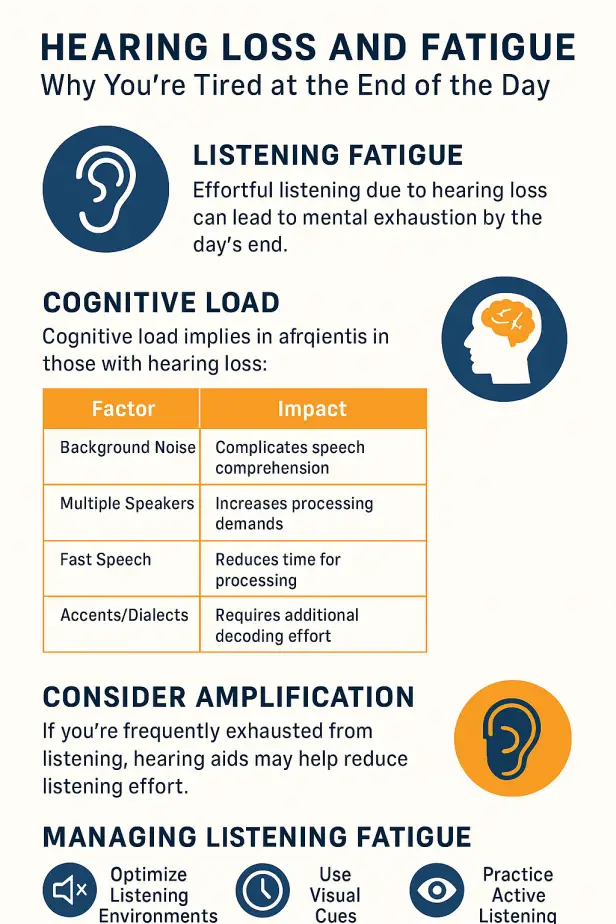Do you often feel mentally drained after a day filled with conversations, meetings, or social interactions? If you have hearing loss, this exhaustion might be more than just typical end-of-day fatigue. It could be a result of listening fatigue, a phenomenon where the extra effort required to hear and understand leads to significant mental and physical tiredness.

Understanding Listening Fatigue
Listening fatigue, also known as auditory fatigue, occurs when the brain becomes overwhelmed by the continuous effort to process sounds, especially in challenging listening environments. For individuals with hearing loss, everyday situations like conversations in noisy settings can become mentally taxing.
Research indicates that the increased cognitive load from trying to comprehend speech with impaired hearing can lead to symptoms such as irritability, stress, and overall tiredness.
The Role of Cognitive Load
Cognitive load refers to the amount of mental effort being used in the working memory. When hearing is compromised, the brain must work harder to fill in gaps and piece together fragmented sounds, leading to cognitive overload [HearingLife].
| Factor | Impact |
|---|---|
| Background Noise | Complicates speech comprehension |
| Multiple Speakers | Increases processing demands |
| Fast Speech | Reduces time for processing |
| Accents/Dialects | Requires additional decoding effort |
When to Consider Amplification
Amplification devices—such as hearing aids—play a critical role in reducing the mental strain caused by hearing loss. When you struggle to follow conversations, especially in noisy environments, your brain works overtime to fill in the gaps. This constant effort often leads to listening fatigue, which can feel like mental exhaustion by the end of the day. Hearing aids help by improving sound clarity and speech understanding, allowing your brain to process information more effortlessly.
You might consider amplification if you:
- Frequently feel drained after social events or meetings
- Avoid group conversations or noisy settings due to difficulty hearing
- Need to turn up the TV volume louder than others prefer
- Ask people to repeat themselves often
- Feel like you can hear, but not clearly understand speech
In these cases, hearing aids may significantly improve not just your hearing—but your overall quality of life.
Additionally, the U.S. Food and Drug Administration (FDA) has made hearing solutions more accessible than ever. As of 2022, over-the-counter (OTC) hearing aids are available for adults with perceived mild to moderate hearing loss, without requiring a prescription or visit to an audiologist. This opens the door for more people to try amplification early—before communication challenges become overwhelming. Or get professionally fit hearing aids through discounts from ZipHearing or similar providers.
However, if you suspect your hearing loss is more than mild, or if OTC options don’t meet your needs, a comprehensive hearing evaluation with an audiologist is essential. An audiologist can recommend custom-fit devices that are fine-tuned to your hearing profile, provide real-ear measurements, and guide you through adapting to amplification.
Remember: Early intervention often leads to better outcomes. The sooner you address hearing loss, the more you can preserve your cognitive function, maintain social connections, and reduce fatigue.
Benefits of Amplification
- Improved speech understanding
- Reduced cognitive effort
- Enhanced social engagement
- Decreased listening fatigue
It’s essential to consult with an audiologist to determine the most suitable amplification option for your specific needs. They can provide personalized recommendations based on your hearing profile.
Managing Listening Fatigue
In addition to amplification, there are strategies to manage and reduce listening fatigue:
- Optimize Listening Environments: Choose quiet settings for conversations and minimize background noise when possible.
- Take Listening Breaks: Allow yourself periods of rest to reduce mental strain.
- Use Visual Cues: Rely on lip-reading and facial expressions to aid comprehension.
- Practice Active Listening: Focus on the speaker and confirm understanding when necessary.
Creating a supportive environment is key to helping someone manage listening fatigue. Start by minimizing background noise whenever possible. Turn off unnecessary devices, close doors to reduce outside noise, and choose quieter places for conversations. Sit in well-lit areas so the listener can use context cues and lip-reading skills [Augusta ENT].
Further Reading
For more information on hearing loss and related topics, consider exploring the following resources:
Remember, acknowledging the challenges of hearing loss and seeking appropriate interventions can lead to improved quality of life and reduced fatigue.

